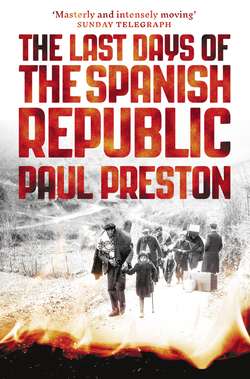The Last Days of the Spanish Republic

Реклама. ООО «ЛитРес», ИНН: 7719571260.
Оглавление
Paul Preston. The Last Days of the Spanish Republic
COPYRIGHT
DEDICATION
CONTENTS
ACKNOWLEDGEMENTS
1. An Avoidable Tragedy
2. Resist to Survive
3. The Power of Exhaustion
4. The Quest for an Honourable Peace
5. Casado Sows the Wind
6. Negrín Abandoned
7. In the Kingdom of the Blind
8. On the Eve of Catastrophe
9. The Desertion of the Fleet
10. The Coup – the Stab in the Back
11. Casado’s Civil War
12. Casado Reaps the Whirlwind
EPILOGUE. Repent at Leisure?
PICTURE SECTION
ABBREVIATIONS
NOTES
ILLUSTRATION CREDITS
BIBLIOGRAPHY
INDEX
BY THE SAME AUTHOR
ABOUT THE AUTHOR
ABOUT THE PUBLISHER
Отрывок из книги
Title Page
.....
The more immediate military objective for which the huge Army of the Ebro was created had been to divert the rebel attack on Valencia. Given the Republic’s lack of armaments, it was an immensely risky venture. By 1 August, the Republicans had reached Gandesa 40 kilometres from their starting point, but there they were bogged down when Franco ordered massive reinforcements, including the Condor Legion, to be rushed in to check the advance. With inadequate artillery and air cover, the Republicans were subjected to three months of fierce artillery bombardment and sweltering heat.28 Despite its strategic irrelevance, Franco was determined to recover the lost ground irrespective of the cost and relished the opportunity to catch the Republicans in a trap, encircle and destroy them. He could simply have contained the Republican advance and driven forward against a near-helpless Barcelona. Instead, he preferred, irrespective of the human cost, to turn Gandesa into the graveyard of the Republican army. With nearly 900,000 men now under arms, he could afford to be careless of their lives. At stake in this desperate and ultimately meaningless battle was the international credibility of the Republic. Munich had undermined the already dwindling faith in the possibility of victory among both the civilian population and the officer corps. Overwhelming logistical superiority in terms of air cover, artillery and troop numbers would see Franco score a decisive victory. In a sense, the Ebro operation, initially a tactical success, was a strategic disaster for the Republic since it used up vast quantities of equipment and left the way open for the rebel conquest of Catalonia.29
Ten days before the signing of the Munich Agreement, Vicente Rojo had drawn up a detailed report on the Republic’s military situation in the context of the Czechoslovak crisis. It was his hope that the democracies would resist Hitler’s demands and provoke a general war in which the Spanish Republic would be allied with Britain and France.30 Neverthless, he also analysed the likely consequences should the democracies give in to Hitler. Rojo’s conclusion was that such a capitulation would give Italy and Germany an even freer hand to help Franco than hitherto: ‘our war would enter, in such a case, a period of acute crisis because of the greater difficulties that we would have to overcome in order to sustain the struggle against an ever more powerful enemy’. Nevertheless, Rojo was still optimistic that ‘a favourable resolution of our conflict’ could be achieved. For this to happen, supplies of food and war matériel would have to be secured and the army’s morale kept high and its organization improved. These two conditions he described as ‘doable. They are problems for the Government.’ To this end, he called for an effort to obtain greater foreign help and for a centrally controlled war effort such as that enjoyed by Franco – more efficient rationing, measures to be taken against those who evaded conscription, a single command for all the armed forces, central control of transport facilities and of industry, and an end to the proliferation of political parties and of competing newspapers.31
.....